Pages
736
[column 1]
The pupils are encouraged to becom members of the Public Library, becau reading not only is the basis of ment and intellectual progress, but it mak the master of daily school lesso much easier to the pupil. Their libra cards are constantly in use, and a go grade of literature is imbibed.
Mr. Thelluson has established t system of Merit List, whereon t names of all the boys who are regul in attendence and orderly in behavi are enrolled monthly. This is an i centive to the boys, and its good re is plainly apparent. In addition to t
[column 2]
those who favored the adoption of the resolution. Not only are the colored Democrats of Brooklyn aroused over the dismissal of Langston and Robinson, but in New York the colored Tammanyites and Wilson men do not hesitate to criticize Wood's actions. A lively political war is threatened.
83415
[column 3]
The subject of this editorial is Mr. Ralph E. Langston, the son of the late John Mercer Langston, who has been associated with the Democratic party of the State of New York; a young man of ability and influence among his people. He is respected by the most influential and prominent white Democrats in the State of New York, and highly commended by those under whom he has served in the many official positions in his State. It is said that every position he has held, in the city of New York has been conducted in a highly commendable manner; so much so that the socalled leader of the colored Democracy, Robert N. Wood, became envious and jealous of his power among the Negro Democracy in the State. For many years Mr. Langston, although a citizen and property owner in this city, has affiliated and worked with the Democracy of his State. He was far-sighted enough to be the first Negro in the city of New York to organize a Wilson and Marshall Democratic Club. This was the cause of Robert N. Wood to misrepresent him to the Tammany chief, Mr. Murphy, for whom Mr. Langston has the greatest respect. It was Mr. Murphy who has done so much for Negro Democracy in the city and State of New York, and to whom Mr. Langston is loyal and grateful. The Bee, of course doesn't believe in the Democracy of Mr. Langston. The Bee is a simon pure Republican journal, but since it is a fact that Negro Democrats will be given consideration by the incoming administration, there is no man the Negroes of this country would like to see recognized than Ralph E. Langston, the son of one of the greatest Negroes in the United States. Mr. Langston is not only a leading and representative Negro, but he is a man of ability and integrity and would not only reflect credit upon the colored race, but the Democratic administration. Among his people no man is more respected. He is respected because he comes from a family whose ancestors have a place in history, and whose father especially, was a man of learning and no doubt the greatest orator and Negro diplomat in this country. John Mercer Langston endeared himself with the Negro because he was a devoted friend of the young man and the struggling students. No man ever came to Mr. Langston for help that he failed to receive it. He never was too great to recognize and assist the most humble citizen. Mr. Langston was not vindictive. He never had a friend to reward or an enemy to punish. Every needy American looked the same to him Mr. Ralph E. Langston, the subject of this article, possesses his father's traits. Dignity and refinement permeate the very atmosphere of this distinguished family, the mother no exception. She is the personification of refinement. When she was at the Haytian court no lady was more respected and none were more honored than the distinguished father and mother of young Langston, who has all the attributes of his father and mother, but who has seen fit to ally himself with a different political party. There is no Negro Democrat, as The Bee stated before, more influential with the Negroes in this country than Mr. Langston, who was recently made a victim by a narrow, contracted Negro Democrat whose political doom is weighed in the balance. There is everything in a name
737
1251 South 18th Street PHILADELPHIA PA. March 17, 1913.
Joseph P. Tumulty, Esq., Secretary to the President, Washington, D.C.
[stamp: THE WHITE HOUSE MAR 18 1913 RECEIVED]
My dear Mr. Tumulty:-
I am sending, in your special care, another letter to President Wilson. I wish you would kindly read this letter, and the enclosed newspaper clipping, with care yourself before bringing it to the attention of the President, because it takes up the question of Negro political patronage, with which I learn you are already much beset, and which I very much fear is being handled from the outside in a way that is most likely to embarrass both the Negro race and the Democratic Administration.
If you will give this matter your earnest attention I trust that I will not again soon find myself called upon to intrude upon your generosity of nature.
Your humble servant,
J. S. Stemon
83417
738
1251 South 18th Street PHILADELPHIA. PA, March 17,1913.
President Woodrow Wilson, The White House.
Dear Mr. President:-
I have hesitated long before writing you this letter: Because I do not wish to so frequently intrude upon your time; because I have written you in much the same strain before; because I fear that my discussion of the subject here mentioned may border on presumption; and, most of all, because I fear that the motives which prompt me may be largely misconstrued. Were my interests, and your interests and those of the third party, alone at stake, I could easily yield to my natural impulse to be silent. But, alas!the situation is one which must inevitably effect, for better or worse, the attitude of the public toward the Negro race for years and years to come.
I allude to the situation disclosed by the enclosed editorial from the Richmond, Va., Planet, in which is published certain correspondence purporting to have passed between yourself and Bishop Alexander Walters. I have marked the most salient points in this editorial to relieve you of the necessity of reading it through The writer of this editorial is Mr. John Mitchell, Jr., the noted Negro banker; and while his mode of expression may be crude and grotesque, he is widely recognized as one of the most conservative and level-headed Negroes in this country. You will observe that he here takes almost the identical position that I have taken in several letters to you; namely, that nothing but consternation and confusion can come from your every act and utterance favorable to the Negro being flaunted before the public, especially in matters involving their appointments to office or your defending their civi1 and political interests.
It is significant that these ebulitions of Bishop Walters are being noted chiefly, if not solely, by the Southern press. We know that it is from this section that the most open and unyielding hostility to Negro recognition must be expected. At your first failure to please a certain element of that section (with no thought of detracting from the many noble men and women of the South) these thoughtless utterances of Bishop Walters may be resurected and distorted and made to plague and embarrass you and discredit the Negro to an extent which will make it not only impossible for you to execute your good intentions relative to that race, but also curtail your ability to carry out the other great measures which you have in view.
I reiterate again and again that the good intentions of Bishop Walters are not to be impugned. But he has given abundant evidence, as I wrote you relative to his demand upon Democratic lead-
83418
739
President Wilson 2.
ers that they publicly promise to obliterate all laws and customs in the South not favorable to the Negro, as a bid for Negro votes, that he is utterly lacking in a sense of proportion, and in the ability to weigh the logical effects upon the public of his public demands and utterances. Its seems most obvious to me that whatever you may do for the Negro in the way of repelling the onslaughts against his civil and political interests or in granting him political recognition, should be done with the least possible fanfare, especially by Negroes themselves, unless every anti-Negro force in the country is to be turned against both them and yourself.
I can speak all the more freely on this matter, because I have no political favors to ask either for myself or for my friends. Indeed, under present strained conditions, 1 care little about Federal appointments for Negroes generally, except to the extent that your attitude toward them in this connection might be taken by the public to reflect just friendliness or unjust hostility. I might easily make all of these suggestions to Bishop Walters, and thus save you annoyance over these more or less petty affairs, but for the fact that I know he would regard it as an impertinence on my part, and assume that his exalted position, if nothing more, makes him the best possible judge, especially among Negroes, as to their highest interests in this connection.
I therefore implore you, President Wilson, for your own good and for the good of my poor race, already crushed and bleeding beneath the scourge of avowed enimies and blundering friends, to find some way of curbing these outbursts of Bishop Walters, before he forces open flood-gates of vituperation and vilification from which it will take the Negro and the nation countless years to recover.
Your humble servant,
J. S. Stemons
83419
740
THE RICHMOND PLANET, RICHMOND, VIRGINIA.
[column 1] [image: THE PLANET]
Published every Saturday by JOHN MITCHELL, JR., at 811 N. Fourth Street, Richmond, Va. _______________________________________ JOHN MITCHELL, JR., . . . EDITOR _______________________________________ All communications intended for publication should be sent so as to reach us by Wednesday. _________________________________________ TERMS IN ADVANCE One Copy, per year . . . . . . . . . $1.50 One Copy, eight months . . . . . 1.00 One Copy, six months . . . . . . . . . 80 One Copy, four months . . . . . . . . 50 One Copy, three months . . . . . . . 40 Single Copy . . . . . . . . . . . . . . . . . .05 ____________________________________________ ADVERTISING RATES. For one inch, one insertion . . . . . . . . . . . $.50 For one inch, each subsequent insertion . .49 For two inches, three months . . . . . . . . . 6.60 For two inches, six months . . . . . . . . . . 10.00 For two inches, nine months . . . . . . . . .14.08 For two inches, twelve months . . . . . . . 20.00 Marriage and Funeral Notices, one inch . .50 Standing and Transient Notices, per line . 10 ___________________________________________ POSTAGE STAMPS OF A HIGHER DENOMINATION THAN TWO CENTS NOT RECEIVED ON SUBSCRIPTIONS. _____________________________________________ THE PLANET is issued weekly. The subscription price is $1.50, per year, in advance.
There are four ways by which money can be sent by mail at our risk:—In a Post Office Money Order, by Bank Check or Draft, on an Express Money Order, and when none of these an be procured, in a Registered Letter.
MONEY ORDERS—You can buy a Money Order at you Post Office, payable at the Richmond Post Office, and we will be responsible for its late arrival.
EXPRESS MONEY ORDERS can be obtained at any office of the American Express Co., the United States Express Co., and the Wells Fargo and Co's Express Compay. We will be responsible for money sent by any of these companies. The Express Money Order is a safe and convenient way for forwarding money.
REGISTERED LETTER—If a Money Order, Post Office or an Express Office is not within your reach, your Postmaster will Register the Letter you wish to send us on payment of ten cents. Then, if the Letter is lost or stolen, it can be traced. You can send money in this manner at our risk.
We cannot be responsible for money sent in letters in any other way than one of the four ways mentioned above. If you send your money in any other way, you must do it at your own risk.
RENEWALS, ETC.—If you do not want THE PLANET continued for another year after your subscription has run out, you then notify us by Postal Card to discontinue it. The courts have decided that subscribers to newspapers who do act order their paper discontinued at the expiration of time for which it has been paid are held liable for the payment of the subscription up to date when the order the paper discontinued.
COMMUNICATIONS—When writing to us to renew your subscription or to discontinue your paper, you should give your name and address in full, otherwise we cannot add your name on our books.
CHANGE OF ADDRESS—In order to change [?] ___________________________________________ Entered at the Post Office at Richmond, Va., as second-class matter. ___________________________________________ SATURDAY ............ MARCH 8, 1913 __________________________________________ [column 2]
THE PRESIDENT AN [THE OFFICE?] SEEKERS
President Woodrow Wilson has been elected and inaugurated. The following statement issued from the White House will be read with interest and will no doubt cause "cold shivers" down the spinal columns of many of the faithful:
"The President regrets that he is obliged to announce that he deems it his duty to decline to see applicants for office in person, except when he himself invites the interview. It is his purpose and desire to devote his attention very earnestly and very constantly to the business of goveernment and the large questions of policy affecting the whole nation and he knows from his experience as governor of New Jersey (where it fell to him to make innumerable appointments) that the greater part both of his time and of his energy will be spent in personal interviews with candidates unless he an [?] invariable rule in the matter. It is his intention to deal with appointments through the heads of the several executive departments."—White House statement.
The office-seekers will now proceed to swarm through the offices of the several executive departments. The evident conclusion is that if they find the greatest part of both the time and energies devoted to personal interviews with the office-seekers it will be all right.
This action would seem to [br?] the distinguished Bishop Walters from the White House and to suggest to Chief Wood that he will best promote the peace of the Chief Executive of the nation by remaining in New York. There is a loop-hole though for Bishop Walters. He can go to the White House when President Wilson invites the interview.
In light of the recently published correspondence of President Wilson with the distinguished clerical political chieftain, who can doubt but what he will be invited?
It may be that the invitation to Bishop Walters may not reach him until next Fall, but this will give him and his family time to become familiar with Washington, although he may have been "fagged out" by the importunities of the office-seeker long before that time.
He may find too that his religous duties may call him to his circuit and he may keep going his rounds until he recuperates sufficiently to stand another bombardment at the hands of his political supporters and seekers after office. Bishop Walters now has our sympathy and six months hence he will be entitled to the commiseration of the public.
He is not a seeker after office for himself but for others. In [?] ble that he must devoted his [?] voice and hypnotic smile upon the heads of the several executive departments? It would seem so.
[column 3]
New York Democracy is unalterably opposed to political dictatorship on the part of any other man. It takes the position that autonomy is of the very essence of Democracy, and openly announces that it will make a most determined fight not only to maintain inviolate its own autonomy but to establish the principle that the Colored Democratic organization in the several States shall be the sole authoritative agencies for the intermediation with the part on behalf of individuals.
The New York leaders assert that Bishop Walters and his friends are proposing that the Democratic Party shall treat with the Negro precisely as the Republican Party treated with him, namely: through the agency of designated colored leaders, and not selected by the Negro himself. The fatal defects of such a system were plainly manifest during the last campaign. The Republican party was unable to effectively to reach the great bulk of Negro voters, simply becuase it had to rely on men, who were, in the last analysis, merely agents of the party, and not regularly chosen and accredited leaders of the race.
This is strong language, but it is made stronger. Here it is:
The New York organization, then, as it maintains, is fighting for the vital principle that colored men in the Democratic party shall have the right to select their own leaders, and not be compelled to accept leaders designated for them. Although Bishop Walters enjoys the title of President of the National Colored Democratic League, the New York Democrats contend that he has never received the authoritative indorsement of colored Democrats for leadership, in the sense of Dictatorship.
The New York Democracy further contends that there is no satisfactory evidence that the Bishop was ever elected to the League; or, if he ever was nominally elected, the body of which elected him was not representative, and lacked authority, being improperly and inadequately called, and composed for the most part of the Bishop's personal friends and dependents in Washington, D. C.: many of whom do not possess the elective franchise, or, if they possess it, either do not exercise it, or have no influence in the communities where they legally reside.
It is true that there was no general election held at the Baltimore convention of the League; and it is said that the Bishop refused to submit to one.
This then is the beginning of a long and bitter fight among the colored contingent of the Democratic Party. It will not be many weeks before this unpalatable dish of dissention will be served to President Woodrow Wilson. Will he recognize as absolute the dictatorship of Bishop Alexander Walters or will he adopt the democratic policy as outlined by the New York Colored Democracy?
There is middle ground though. Will he call in council that elusive, diplomatic, "right side up with care" Dr. Booker T. Washington as the least of three evils, or will he exclaim in disgust, "The plague upon both houses"?
BISHOP WALTER'S BLUNDER
It is reported from Washington that the Democrats, composed of cit-
[column 4]
January 17, 1913. "My dear Bishop Walters: "I have made it an absolute rule not to indicate what I am going to do about appointments because I am not now making promises of any kind, but I am sure you will not yourself feel uneasy after the general assurance I have taken pleasure in giving you from time to time. "Sincerely yours, "WOODROW WILSON."
The second, dated December 21, 1912, reads: "My dear Bishop Walters: "I read your letter of December 17, and the suggestions you quote Congressman Burleson as making with great interest. You may be sure that these matters will have my most earnest and friendly consideration. "Cordially and sincerely, "WOODROW WILSON."
The first is as follows: "My dear Bishop Walters: "It is a matter of general disappointment to me that I shall not be able to be present at your meeting on Saturday night, but insasmuch as I have cancelled every possible engagement in view of the distressing assault on Mr. Roosevelt, I do not feel that I can properly add others. I am fulfilling only those to which I have been bound by many weeks.
"It would afford me pleasure to be present, because there are certain things I want to say. I hope that it seems superfluous to those who know me, but to those who do not know me perhaps it is unnecessary for me to assure my colored fellow-citizens of my earnest wish to see justice done them in every matter and not mere grudging justice, but justice executed with liberality and cordial good feeling. Every guarantee of our law, every principle of our Constitution commands this, and our sympathies should make it easy.
"The colored people of the United States have made extraordinary progress toward self-support and usefulness, and ought to be encouraged in every possible and proper way. My sympathy with them is of long standing, and I want to assure them through you that should I become President of the United States they may count on me for absolutely fair dealing and for everything I can assist in advancing their race in the United States. "Cordially and sincerely yours, "WOODROW WILSON."
Bishop Alexander Walters may "know his business," but to our mind, this is the first tactical mistake and political blunder. He has done three things: Attracted the attention of every Negro-hater in Washington and in the country and thereby enlisted their bitter opposition to the political preferment of the colored leaders; drawn to himself a horde of political office-seekers, who desire the ear of the President, and embarrassed the Chief Executive of the nation in his desire to accord fair treatment to the representatives of one of the kindliest race of people on the face of the globe.
Bishop Walters was evidently in good humor, for he is quoted as saying:
"Mr. Wilson is just filled with good will for everybody," said Bishop Walters to The Times-Dispatch representative. "We are confident that he will treat us fairly. If he should make any changes, I feel there is more than a chance of securing the appointment of some good colored men to government service. Dr. Peter J. Smith I hope to have appointed deputy registrar of the treasury, if any change should be made in that office. It is now filled by a colored man. In fact, the registrar
[column 5] in favor of the things which tend toward uplift, improvement and advancement of my people," by requesting him to give advice in the premises.
That advice will either "spell" the elevation of friends of Dr. Washington to political office or the enunciation of the well known Washington doctrine that colored men should leave politics alone and not aspire to political office.
We are of the opinion that Bishop Walters has hindered his case rather than helped it by his publication of the Wilson letters at this time.
With reference to Dr. Washington, we are of the opinion that he has helped his case rather than hindered it by his timely deliverances at Nashville, Tenn. We did not need to be told that President Woodrow Wilson was a friend of Negro education. His whole life shows that. He might make the statement with reference to hundreds and thousands of white Democratic educators in the Southern States.
As the matter now stands, Bishop Walters declares that President Wilson is the friend of the Negro Democratic politician and Dr. Washington declares that President Wilson is the friend of Negro education. We expect to see both of these great leaders in a grapple for recognition and influence at the White House.
We shall be able to hear and see Bishop Walters as the struggle goes on, but as for Dr. Washington, he will work behind a masked battery and only the manner and method of his fighting will disclose the identity of the leader behind the breastworks. ________________________________________ NOTICE.
It hs been found necessary to buy and properly equip the home for homeless and dependent Colored children located at 1513 Taylor street, known as the Working Woman's Industrial Home and Day Nursery, that moved from 516 Third street in July 1910. In order to make the Home perpetual and purchase it, we must appeal to the generaous public for help.
All interested in this work can help by contributing freely through the Mite Boxes and envelopes already distributed which will be called for by a committee wearing a badge containing the words "Children's Home." Contributions can be sent directly to Mrs. J. Calvin Stewart, 1031 West Grace streets, who is the Treasurer of the Building Fund.
No fund can be too small to help. Please do not give money to anyone except those soliciting and wearing the "Children's Home" badge. This work is approved by Gov. Mann, Mayor Ainslie, Dr. J. T. Mastin, Rev. James Buchanan, Judge Richardson and a Committee of Ladies. The work is also endorsed by the Colored Ministers' Conference of the City.
The following compose the [?] Committee for soliciting Funds:
Mrs. Rebeker Violet Crawford, Manager of the Home; Mrs. Adelaide G. Thompson, Mrs. Mattie Hewin, Mrs. Harriet Page, Mrs. H. R. John son, Mrs. Anna Hunter.
Will you be one of the two thousand to contribute $1 or more? If so, please forward it to Mrs. J. C. Stewart, 1031 West Grace street.
We thank the Public School Children for $65 as an offering. We have heading our colored invividual contribution list. Dr. R. E. Jones, $5.00 and Mr. Nelson Williams, $2. WHO WILL BE NEXT.




